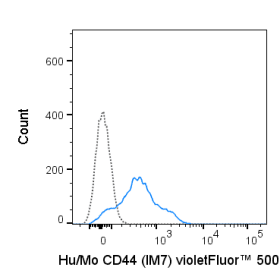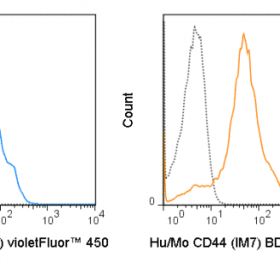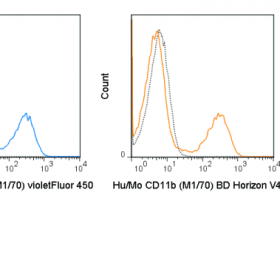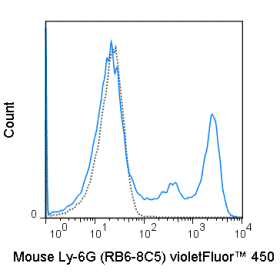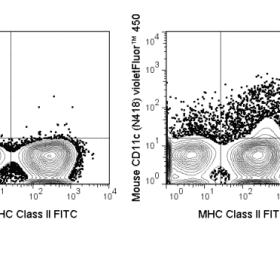Product Description
| Cat No. | Size | Price |
|---|---|---|
| 50-0081-U025 | 25 µg | $19.00 |
| 50-0081-U100 | 100 µg | $47.00 |
| 50-0081-U500 | 500 µg | $184.00 |
Description
The 53-6.7 antibody reacts with the 32-34 kDa alpha subunit of mouse CD8, known as CD8a or CD8 alpha. CD8a can form a homodimer (CD8 alpha-alpha), but is more commonly expressed as a heterodimer with a second chain known as CD8b or CD8 beta. CD8 acts as a co-receptor in antigen recognition and subsequent T cell activation that is initiated upon binding of the T cell receptor (TCR) to antigen-bearing MHC Class I molecules. The cytoplasmic domains of CD8 provide binding sites for the tyrosine kinase lck, facilitating intracellular signaling events that lead to T cell activation, development, and cytotoxic effector functions. CD8+ cytotoxic T cells (CTLs) play an important role in inducing cell death of tumor cells, as well as cells infected by virus, bacteria or parasites.
The 53-6.7 antibody is widely used as a phenotypic marker for mouse CD8a expression on cytotoxic T cells, thymocytes, as well as on certain cell types that do not also express the TCR, including some NK cells and lymphoid dendritic cells.
Product Details
| Name | PE Anti-Mouse CD8a (53-6.7) |
|---|---|
| Cat. No. | 50-0081 |
| Alternative Names | CD8 alpha, Ly-2, Ly-35, Ly-B, Lyt-2 |
| Gene ID | 12525 |
| Clone | 53-6.7 |
| Isotype | Rat IgG2a, κ |
| Reactivity | Mouse |
| Cross Reactivity | |
| Format | PE |
| Application | Flow Cytometry |
| Citations* | Willinger T and Flavell RA. 2012. Proc. Natl. Acad. Sci. 109:8670-8675. (Flow cytometry)
Thaventhiran JED, Hoffmann A, Magiera L, de la Roche M, Lingel H, Brunner-Weinzierl M, and Fearon DT. 2012. Proc. Natl. Acad. Sci. 10.1073. (Immunohistochemistry – OCT embedded frozen tissue) Mochimaru H, Usui T, Yaguchi T, Nagahama Y, Hasegawa G, Usui Y, Shimmura S, Tsubota K, Amano S, Kawakami Y, and Ishida S. 2008. Invest. Ophthalmol. Vis. Sci. 49(5):2172-2127. (in vivo cell depletion) Fan K, Zhou M, Pathak MK, Lindner DJ, Altuntas CZ, Touhy VK, Borden EC, and Yi T. 2005. J. Immunol. 175:7003-7008. (Immunohistochemistry – frozen tissue) Nutt SL, Metcalf D, D’Amico A, Polli M, and Wu L. 2005. J. Exp. Med. 201:221-231. (Immunomagnetic bead depletion) Fan G-C, and Singh, RR. 2002. J. Exp. Med. 196: 731-741. (in vitro cell depletion) Bosselut R, Zhang W, Ashe JM, Kopacz JL, Samelson LE, and Singer A. 1999. J. Exp. Med. 190: 1517-1526. (Immunoprecipitation) |
Application Key:FC = Flow Cytometry; FA = Functional Assays; ELISA = Enzyme-Linked Immunosorbent Assay; ICC = Immunocytochemistry; IF = Immunofluorescence Microscopy; IHC = Immunohistochemistry; IHC-F = Immunohistochemistry, Frozen Tissue; IHC-P = Immunohistochemistry, Paraffin-Embedded Tissue; IP = Immunoprecipitation; WB = Western Blot; EM = Electron Microscopy
*Tonbo Biosciences tests all antibodies by flow cytometry. Citations are provided as a resource for additional applications that have not been validated by Tonbo Biosciences. Please choose the appropriate format for each application and consult the Materials and Methods section for additional details about the use of any product in these publications.
[accordions]
[accordion title=”Protocols”]Technical D ate Sheet[/accordion]



